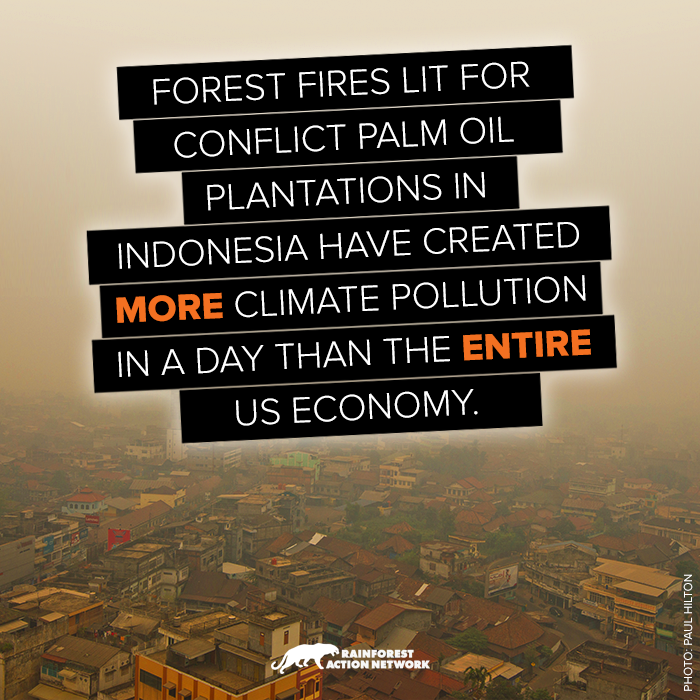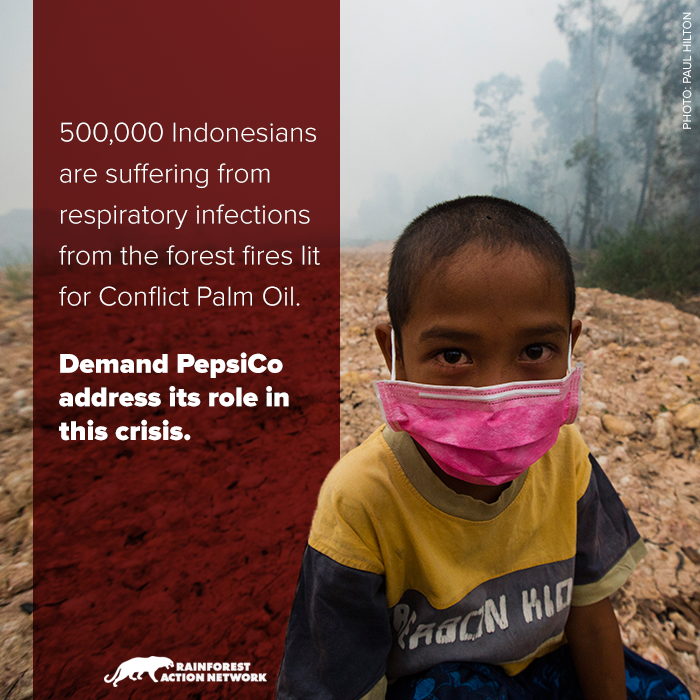As leaders of the world’s largest economies gather at the global climate negotiations in Paris, there’s an ongoing climate emergency unfolding in Indonesia that demands our attention: the country has been burning.
For the past several months, Indonesia has been on fire. Millions of people are suffering from exposure to toxic smoke, which has proved deadly in some cases, the result of out-of-control forest fires intentionally lit to cheaply clear land for industrial palm oil and paper plantations. This fire crisis happens every year, but 2015 was the worst yet.
Climate Impacts What does this have to do with the global climate conversation? To give you a sense of scale: this year, the fires unleashed upwards of 1.7 billion tons of carbon into our air.1 The resulting climate pollution from the first three weeks of these fires alone were greater than Germany’s entire annual emissions.2 The smoke from these fires can be clearly seen from satellite images from space. On some days in the past few months, the daily carbon pollution from the forest fires alone have been greater than the daily emissions of the entire US economy.3 And what’s more, it will happen again next year, like clockwork. This alarming, annual crisis makes it clear that no plan for global climate stability can succeed without effectively supporting Indonesia with both responsible human rights and environmental policy to solve its out of control fire crisis and its larger deforestation problem.
What does this have to do with the global climate conversation? To give you a sense of scale: this year, the fires unleashed upwards of 1.7 billion tons of carbon into our air.1 The resulting climate pollution from the first three weeks of these fires alone were greater than Germany’s entire annual emissions.2 The smoke from these fires can be clearly seen from satellite images from space. On some days in the past few months, the daily carbon pollution from the forest fires alone have been greater than the daily emissions of the entire US economy.3 And what’s more, it will happen again next year, like clockwork. This alarming, annual crisis makes it clear that no plan for global climate stability can succeed without effectively supporting Indonesia with both responsible human rights and environmental policy to solve its out of control fire crisis and its larger deforestation problem.
Forest destruction accounts for roughly 20% of global emissions and Indonesia is ground zero for this destruction. Much of the land that is being burned is carbon-rich peatland––a key naturally occurring form of carbon storage. Peatlands are a thick swamp-like accumulation of thousands of years of decaying matter. When drained to expand industrial palm oil and paper plantations, peatlands become dry kinder boxes. As they burn, our planet’s natural system for storing carbon is literally going up in smoke. The Indonesian government has recently taken some promising steps to ban peatland burning but to successfully address this disaster, Indonesia requires the support of the international community. Knowing the facts, it is appalling how relatively little media attention this has received.4 Civil society organizations, media, and governments serious about action on climate change can no longer ignore this crisis.
Health Impacts
Like most climate catastrophes, the fires not only spell a long term threat to our livable world, but has an immediate impact on public health.4 The uncontrollable smoke contains harmful chemicals that have caused an estimated 500,000 respiratory infections and at least 19 confirmed deaths.2 The most vulnerable populations, like infants and the elderly, are hit the hardest by the toxic haze that blankets much of Southeast Asia. Millions of Indonesians are suffering from displacement, lack of access to clean air and water and lost livelihoods, as well as systemic health problems. This blatant assault on basic human rights cannot be allowed to continue. The impact on wildlife has also been devastating. The fires have lead to the destruction of vast tracts of rainforests that are the home to the world’s last wild orangutans, tigers, rhinos and elephants.5 Indonesia has some of the most biodiverse rainforests on the planet, like the Leuser Ecosystem, that require protection from this growing threat.6
Corporate Accountability
 The expansion of industrial palm oil and pulp plantations is the problem and it is driven by corporate greed and our insatiable appetite for cheap snack foods and other supermarket products.7 The Snack Food 20 are some of the largest snack food corporations on the planet and use tons of palm oil in their products everyday. Laggard corporations like PepsiCo and Heinz-Kraft need to take this issue seriously and break the link between their products and carbon pollution, human rights abuses and deforestation. Despite efforts by their suppliers to deflect the blame to poor people, who have been hardest hit by fires, we know who the real culprits are. Paper promises are not enough and this year’s forest fires prove that they are not working. This tragedy can be prevented from occurring again, but the solution requires an emergency scale response from governments, corporations and us––the end consumers.
The expansion of industrial palm oil and pulp plantations is the problem and it is driven by corporate greed and our insatiable appetite for cheap snack foods and other supermarket products.7 The Snack Food 20 are some of the largest snack food corporations on the planet and use tons of palm oil in their products everyday. Laggard corporations like PepsiCo and Heinz-Kraft need to take this issue seriously and break the link between their products and carbon pollution, human rights abuses and deforestation. Despite efforts by their suppliers to deflect the blame to poor people, who have been hardest hit by fires, we know who the real culprits are. Paper promises are not enough and this year’s forest fires prove that they are not working. This tragedy can be prevented from occurring again, but the solution requires an emergency scale response from governments, corporations and us––the end consumers.
We all have a role to play in the solution. Specifically, Indonesian President Joko Widodo has the opportunity to respond to the fire crisis, leverage the international support it has evoked, and address the deeper structural problems that are related to the failed model of economic development that has caused this destruction to occur.4 No longer should a few corporate titans be allowed to siphon billions in short-term profit out of the Indonesian economy while plantation workers endure deplorable conditions and we cook our planet. Indonesian civil society organizations are calling for an immediate moratorium on forest and peatland clearance, a halt to industrial plantation expansion, and to aggressively enforce existing environmental laws. With the momentum of a growing international climate justice movement, negotiators in Paris have the opportunity to take bold action to achieve human rights and address this escalating crisis.
References:
1. ”Indonesia bans peatlands destruction” Mong Bay, 11/10/15
2. “Indonesia’s fires labelled a ‘crime against humanity’ as 500,000 suffer” The Guardian, 10/26/15
3. “Indonesia’s Fire Outbreaks Producing More Daily Emissions than Entire US Economy” World Resources Institute, 10/16/15
4. “Indonesia is burning. So why is the world looking away?” The Guardian, 10/30/15
5. “Indonesia’s Forest Fires Take Toll on Wildlife, Big and Small”, New York Times, 10/30/15
6. “The Last Place on Earth: Tracking Progress and New Opportunities to Protect the Leuser Ecosystem” Rainforest Action Network, Nov 2015
7. “Indonesia’s Forests: Under Fire” Greenpeace, Nov 2015
